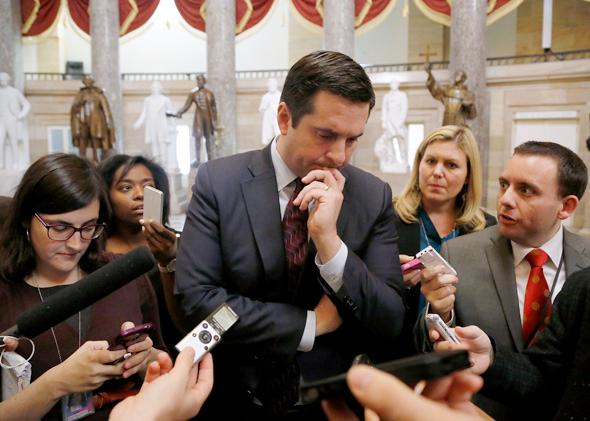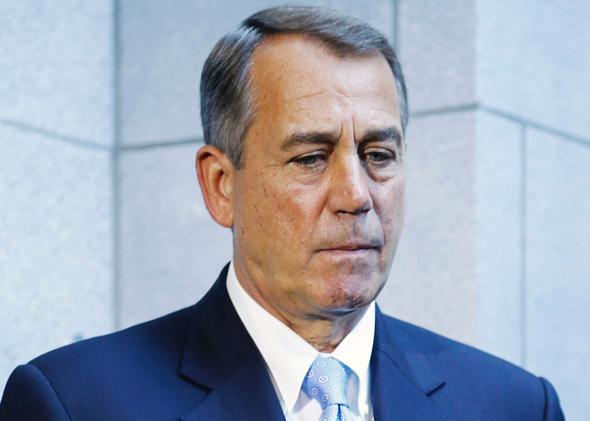For the men and women of the U.S. Senate, Wednesday morning was a time of jubilation. Hark—a deal was born! Sens. Harry Reid and Mitch McConnell came bearing a bipartisan agreement that punted the debt and government funding deadlines with a minimal amount of riders. “Political adversaries set aside their differences and disagreement,” said Majority Leader Reid. “I think we have the framework for the kind of bipartisanship that the American people need and want,” said Sen. John McCain. The Arizona senator, who’d logged hours of TV interviews blaming the House Republicans for the shutdown, was closing the book on the whole mess.
At the same time, far away from the sound of handshakes and backslaps, the House Oversight Committee was conducting an investigation into the real culprit of the shutdown. Jonathan Jarvis, director of the National Park Service, had been subpoenaed in an investigation of why beloved open-air parks and memorials—the World War II Memorial, especially—were barricaded during the shutdown. Why, asked Rep. Darrell Issa, did an anonymous park ranger tell the Washington Times that the feds would make the shutdown “as difficult as possible”? Why did parks stay open for Occupy Wall Street but closed to the men who stormed Omaha Beach?
“You came before one of our committees and made it clear that you were going to reinterpret the First Amendment to include basically people sleeping in the parks, defecating on the lawns, creating a health hazard for the people of the District of Columbia,” said Issa.
“Do you consider it an exercise of your First Amendment right to walk to a monument that you helped build,” asked South Carolina Rep. Trey Gowdy, “or is it only just smoking pot at McPherson Square?”
Within hours, Gowdy and Issa would join their fellow House Republicans for a short meeting. House Speaker John Boehner would admit defeat. But some Republicans were declaring a victory of sorts—maybe not now, but down the road—for what the media had already judged to be a historic debacle. They had revealed President Obama to be a cynical political operator. They had proved to voters that they did everything they could to stop Obamacare. When the next spending fight comes around, they insisted that enduring this shutdown would strengthen their position.
“It depends on whether or not we’re able to articulate why we did what we did,” said South Carolina Rep. Mick Mulvaney, a conservative who voted against Boehner for speaker but sings hosannas for him now. “We believe we did it for the right reasons. We believe it was good policy. We believe good policy makes good politics. But we have to be able to explain that policy in order to accomplish it. I did an interview with a local radio station back home a week ago, and it started with them saying it was ‘just seven days until default.’ That was an indication that our message was not getting out.”
Human beings have been putting their best spin on defeats since the invention of “winning” and “losing.” Obviously, the many Republicans who don’t want to trash their colleagues on the record are going to look for the Alamo underneath the rubble of this loss. But this shutdown had meant a lot to the party. Only a few dozen current members of the GOP conference had endured the last shutdown in 1995–1996. Those who hadn’t—and some of those who had—have insisted for years that it was not truly a defeat for the party. In his 1998 memoir, Newt Gingrich blamed the media for making that shutdown a “story of Republican heartlessness.” By 2010, when he reminisced about the shutdown, Gingrich argued that its real lesson was that his GOP had held onto the House in 1996 and balanced the budget—and that if the GOP shut down the government to stop Obamacare, the country would rally to the cause.
As dealmania spread across the Capitol on Wednesday, this spin remained battered but alive. “I haven’t been home now for close to a month, and so it’s not an easy venture all the way across the board,” said Arizona Rep. Matt Salmon, a class of 1994 Republican who returned to Congress this year after a decade in retirement. “As we saw last time, in 1996, we had the last government shutdown, 20-some days, and just a couple of years later we did the unimaginable: We balanced the budget for the first time in 40 years. We got through some of the most meaningful welfare reform that this country never believed was possible. I think part of it is that when both sides see that you’re actually willing to stand and fight on principle, it changes the dynamic. It’s not evident right now, but I think it will be.”
According to Salmon, shutting down the government for more than two weeks probably proved to most people that the feds could do more with less. “Most Americans probably thought, ‘Wait a minute, I thought this was supposed to be cataclysmic.’ Like with sequestration—we were told the sun wouldn’t come out the next morning, and it did. It was much ado about not a lot,” Salmon said. When it hurt, it was because President Obama wanted it to hurt. “We don’t think like that. We don’t shut down monuments to make a shutdown as painful as possible.”
Salmon was one of a half-dozen conservatives who met to talk this over at an on-the-record Wednesday panel sponsored by the Heritage Foundation. As the audience chowed on Chick-fil-A, conservatives denounced any suggestion that the party had been weakened by the shutdown. Idaho Rep. Raul Labrador’s main quibble with the party’s strategy—apart from all the weak-kneed members trashing their colleagues—was that it didn’t raise the debt limit while continuing to debate the continuing resolution, a ploy that would have lengthened the shutdown.
“I actually think we wouldn’t have been able to highlight the mistakes of the [healthcare.gov] rollout without the government shutdown,” said Labrador. “Every major newspaper would have relegated it to A7 or A8. Now it’s on the front page of every newspaper.”
Even outside the Chick-fil-A chamber, Republicans were full of reasons why the shutdown hadn’t hurt. Arizona Rep. David Schweikert tore into one reporter’s question about the “polls” showing the GOP’s reputation falling. “Did you look at the samples?” asked Schweikert. After the reporter slumped away, Schweikert told me that the media’s polls missed the target.

Photo by Jonathan Ernst/Reuters
“We were in the field last week doing some polling,” he said. “I think the left and some of the media supporters on the left are going to be shocked when they look at these underlying numbers—the margin against the health care law among swing voters. The left hates me—the left has always hated me!—the right is with me, and the swing voters are moving. There was some amazing data in there.”
Does this mean that Republicans would enter into another shutdown standoff with no fear? That’s not how they look at it. They view any attempt to blame them for the shutdown, and not the president, as media bias in concentrate. This shutdown proved them right, and they’ll carry that knowledge into the budget battle.
“I think this exposed the president and made clear to the public that he’s unwilling to compromise,” said Michigan Rep. Justin Amash. “There’s going to be a lot of focus over the next few months about the failures of Obamacare. It’ll help Republicans because we stood up and fought—and there’s nobody who can blame Republicans, at this point, for Obamacare. We did what we could.”
Read the rest of Slate’s coverage of the government shutdown.
